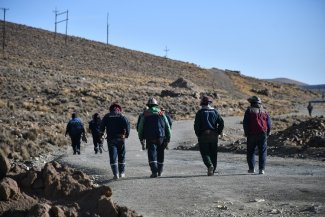
While workplace childcare policies are relatively new in Bolivia, the country is making progress, for example by promoting breastfeeding rooms and day-care facilities. However, such policies are of little use when employers fail to respect labour regulations.
“They think we’ll just give birth and that will be the end of it, then we continue to be productive or we continue to care for our families,” says Tania Aruzamén Zambrana, a researcher, feminist activist and a mother of two young children, recounting her experience during pregnancy.
Zambrana believes that prevailing narratives render breastfeeding and the postpartum period invisible in Bolivia. While there are state policies in place providing for universal subsidies and support for breastfeeding, she says “these policies are still not very effective”.
In Bolivia, salaried working mothers struggle to achieve a balance between work and family life. This reality directly impacts infants during the key developmental stage of breastfeeding.
The Andean country has seen advances in terms of laws that protect the rights of mothers working in public and private institutions, including one hour of mandated breastfeeding time per day. Mothers are also allowed to bring their babies with them to their workplaces, and employers are required to ensure the necessary conditions and provide space for them to breastfeed. In practice, however, companies do not respect these regulations and the state has failed to implement a system for monitoring compliance.
Under Bolivia’s General Labour Law, female employees are entitled to 45 days of fully paid leave before and after delivery, and more time if complications arise, while companies with more than 50 employees are required to provide crèches and spaces for breastfeeding.
According to the experts we spoke to, the two main obstacles preventing progress towards fairer labour relations are, on the one hand, the way that care work is generally viewed in Bolivian society and, on the other hand, the pervasiveness of informal work in the country.
“In Bolivia, 75 per cent of workers are employed in the informal sector, where the General Labour Law has little sway over labour relations,” says Lourdes Montero, coordinator of Oxfam’s Gender Justice Programme in Bolivia.
As Montero explains, women who work in the informal economy are subject to precarious working conditions and often see their rights violated. This means that, despite achievements in labour regulations that benefit working mothers, the debate on care work is still quite new and a lack of understanding of the issue is preventing a more comprehensive approach.
“When you talk to these women about breastfeeding spaces or care facilities at the workplace, for example, that already seems like a luxury to them,” says Montero.
With informality so widespread, many of these women struggle to simply find stable jobs and contracts, secure a decent retirement and access health insurance, among other things.
This makes it difficult to talk about rights related to care work, as Montero explains, largely because of patriarchal and sexist views of relationships and social ties that remain widespread in the country and are often reflected in its public policies.
The main barrier to progress is patriarchy
“In Bolivia, it’s completely taken for granted that raising children is the sole responsibility of women. Many have trouble understanding why the state or employers should in any way share in that responsibility. We have a long way to go towards ensuring these rights,” says Montero.
“There are heartbreaking scenes of women who, for example, have their infant in a small box under the desk at their workplace, partially covered with a blanket so that no one can see them, because they feel that the company is doing them a favour by allowing them to bring their children to work,” she adds.
Unequal power relations at the workplace are a reflection of how care work has historically been assigned to women. A certain complacency and submission is expected of women who find themselves in positions of economic dependence. Many employers “prefer to hire mothers because they can more easily exploit them, they are much more subservient and loyal and they take advantage of that,” says Montero.
As she argues, the exploitation and helplessness that women face in the labour market is largely due to the invisible nature of care work, which must be integrated into the economy if the country’s gender inequalities are to be tackled in a more serious way.
However, Montero believes that pro-family models like the Bolivian one can lead to overly protectionist policies with undesirable long-term effects, and feed into biased discourses that overburden women and ultimately exclude them from the labour market.
“There is already a kind of prejudice that pregnancy biologically disadvantages women’s work performance,” explains Montero. New social relations must be fostered that accord dignity to women’s work. Furthermore, companies must learn to integrate regulations as part of their social and developmental responsibility rather than merely seeing them as an obstacle.
Co-responsibility for care, an ongoing challenge
“It’s important to define what we mean by care work,” says Verónica Paz, research and policy coordinator at Oxfam Bolivia. “Care work refers to all those activities that are related to meeting essential life needs. This includes housework, cleaning, ironing, as well as managing care, doing things like taking children to school, addressing healthcare needs, etc. It entails both caring for others and caring for oneself,” she explains.
Understanding the deeper and broader implications of care work allows us to see how we perceive and construct our ideas around gender-based divisions of labour in our societies and the unequal division of care work between men and women.
According to a report by Oxfam Bolivia, Tiempo para cuidar, Bolivian women “regardless of age, spend nearly seven hours a day on care work, almost twice as much as men,” while “seven out of every 10 women claim to have greater responsibility for care work in their household.”
As Montero explains, a problem this widespread “is far too big for the state to solve alone, or for families to solve alone [or for companies or the market]. It requires all members of society to get involved, because all members of society have something to say.”
Both Paz and Montero believe that it is necessary to question laws and policies, which in general are written to delegate more responsibility to women as caregivers, and to reflect much more broadly on the tasks of production and reproduction.
One example is to include other groups in responsibility for care work so that “we think equally in terms of maternity and paternity leave, that we understand that care work is not just women taking care of small children but also includes women and men taking care of the elderly and the sick.”
“We start from the idea that care sustains life and this is something that has been missing in the general design of public policies in society because it’s almost taken as a given, that is to say, that care just happens,” says Paz.
And informal economy workers?
If even salaried mothers find themselves in a situation where their rights are being violated, the reality of mothers who are self-employed and work in the informal economy is much more precarious.
“What do we do with this army of self-employed women who have no labour rights and no rights associated with maternity and care?” asks Paz.
“For this group, it is necessary to develop a series of public policies that go beyond the norm, including building nurseries and [public] childcare centres” close to the areas where women live, she says.
According to the 2015 Household Survey by the National Institute of Statistics (INE), there are over 3.8 million women over the age of 15 in Bolivia, of whom “58.7 per cent, that is six out of every 10 women aged 15 and older, are mothers of at least one child.” This begs the question of how these women are coping with care work.
“I have to juggle two children; I can’t have jobs with fixed hours – it’s something I haven’t been able to do since my children were born. Who is going to look after them, who is going to pick them up, drop them off, etc.? We urgently need state care policies for women who find themselves in vulnerable situations,” says Aruzamén.
According to Paz, the biggest challenge in this regard is firstly to recognise the heterogeneity of the labour market and the importance of developing more comprehensive care policies, and, most urgently, to take a more realistic look at the situation of Bolivian working mothers, most of whom find themselves trapped and struggling alone in the informal economy.












